Trump’s bearhug leaves Netanyahu with little room to move, and an election is coming
PM has thrown in his lot with the US president, and reaped great benefits, notably on Gaza and Iran. But he has given up control over much of what happens between now and when Israel head to the polls
The Times of Israel
Oct 24, 2025
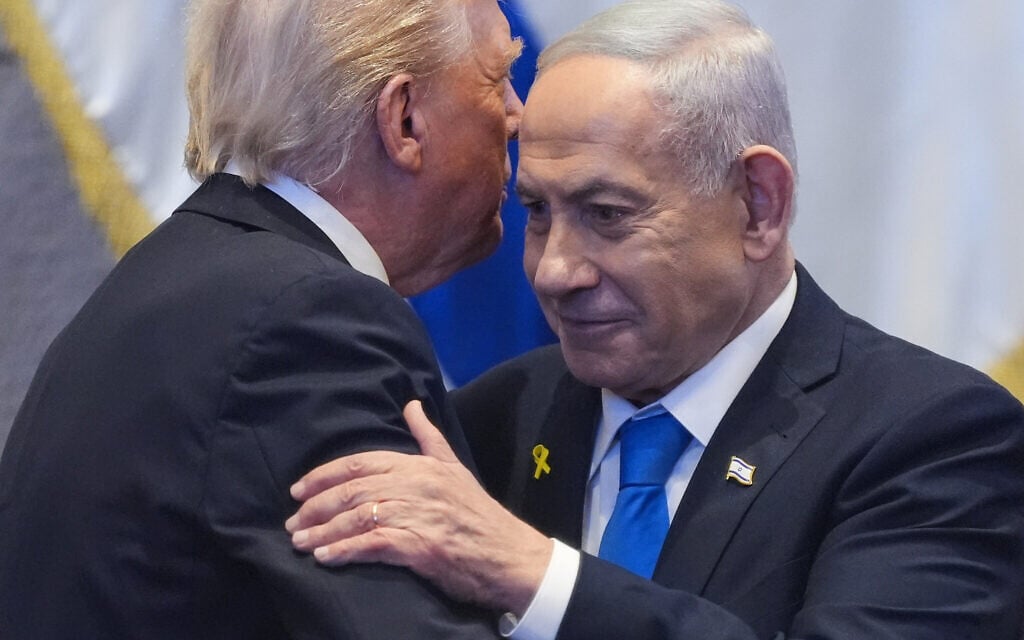
After their amicable meeting in Jerusalem on Wednesday, both Prime Minister Benjamin Netanyahu and Vice President JD Vance rejected the idea that Israel is an American “client state.”
“This is hogwash,” said Netanyahu in response to a question.
“We have a partnership, an alliance of partners,” insisted Netanyahu, “who share common values and common goals.”
Vance made a similar claim: “We don’t want a client state, and that’s not what Israel is. We want a partnership. We want an ally here.”
Despite the protestations from the two officials, it is impossible to ignore the context in which their meeting took place.
Vance was just one of a series of top White House officials coming through Israel this week to keep an eye on the Israel-Hamas ceasefire. Donald Trump’s senior Middle East advisers Steve Witkoff and Jared Kushner had just left the country, and Secretary of State Marco Rubio showed up to swap Vance out on Thursday.
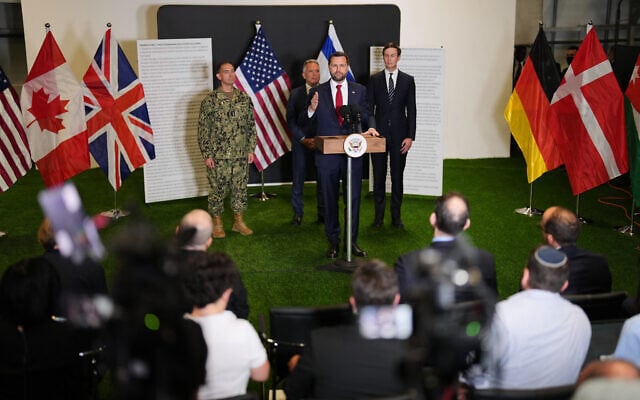
US Vice President JD Vance speaks to the media as US Special Envoy to the Middle East Steve Witkoff and Jared Kushner stand next to him, in Kiryat Gat, Israel, Tuesday, Oct. 21, 2025.
When Vance landed, his first stop was — in what was almost certainly a first for a senior US official — Kiryat Gat. The dusty southern city is the home of the new headquarters for the emerging Civilian-Military Coordination Center.
The building might be on Israeli soil, but one wouldn’t know from the inside. It feels like a US military installation with space set aside for the Israeli and international guests. American troops are everywhere, and many of the signs are written in terse US military-speak.
It’s not only inside the Gaza coordination headquarters where the US is dominant. Trump dictated the terms of the ceasefire that the CMCC is meant to oversee, and left Netanyahu little choice but to accept it.
Being compelled to accept Trump’s Gaza peace plan isn’t a huge problem for Israel in and of itself. Its terms, if actually fulfilled, would represent a victory for Israel and a surrender for Hamas.
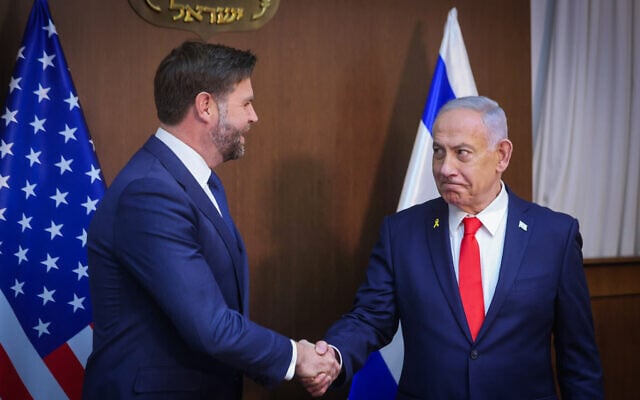
Prime Minister Benjamin Netanyahu (right) holds a press conference with US Vice President JD Vance at the Prime Minister’s Office in Jerusalem, October 22, 2025.
Netanyahu has made a deliberate choice since the US president returned to office — praise Trump, imitate Trump and certainly heed Trump, and under no circumstances publicly disagree with Trump.
The decision has paid off handsomely thus far. He has been invited to the White House four times this year, had the US back all of Israel’s demands for a Gaza ceasefire, and got the living hostages home up front, and saw Trump order US airstrikes on Iran’s nuclear program.
For all the benefits Israel has reaped, however, the costs of the firm Trump bearhug Netanyahu rushed into are also becoming increasingly apparent.
Rambunctious Hamas rebels
The actual implementation of the ceasefire, both in the near- and medium-term, is bringing complications.
Though Trump has talked tougher in recent days, the US administration has shown a predilection to cut Hamas slack for its violations of the terms.

This image grab from a handout video released by the Hamas-run al-Aqsa TV’s Telegram channel on October 13, 2025, shows Hamas gunmen executing blindfolded, bound and kneeling men as a crowd surrounds them in a street in Gaza City.
Hamas did not release any slain hostages in the first 72 hours of the ceasefire, though in Trump’s proposal, it was required to release all of them. It handed over four of the 28 bodies soon after the deadline; since then, it has handed over bodies in small groups, and Israel insists it is intentionally slow-walking the process.
Trump accepted Hamas excuses: “Some of those bodies have been in there a long time, and some of them are under rubble. They have to remove rubble. Some are in tunnels… that are way down under the earth.

Family and friends attend the funeral ceremony of slain hostage Tamir Adar at Kibbutz Nir Oz on October 23, 2025.
He also excused a deadly Hamas attack on IDF troops in Rafah on Sunday, blaming it on “rambunctious” rebels within the group. After threatening Hamas and bombing for a few hours, by late Sunday Israel was declaring that the ceasefire was back in effect.
Israel has also been forced to back down from its threats to keep the Rafah Crossing closed and block some humanitarian aid from entering Gaza in retaliation for Hamas violations.
“Do not act in a way that would endanger the ceasefire. We want to do everything to reach the second phase,” Kushner and Witkoff reportedly told Netanyahu this week.
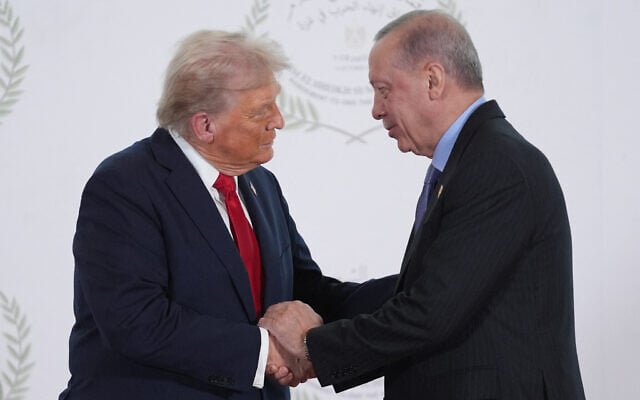
US President Donald Trump, left, greets Turkish President Recep Tayyip Erdogan during a summit on Gaza in Sharm el-Sheikh on October 13, 2025
It’s not only regarding the threat posed by Hamas that Israel is running up against American boundaries.
Turkey, a bitter critic of Israel and Hamas backer, enjoys a close relationship with the Trump White House, and is playing a growing role in the Gaza ceasefire.
The Prime Minister’s Office told The Times of Israel on Wednesday that no Turkish troops would be allowed in Gaza, and Vance told this reporter at his Tuesday press conference in Kiryat Gat that Jerusalem would decide which foreign troops are allowed “on its soil.”
But the vice president was quick to note “that there’s a constructive role for the Turks to play.” The Trump administration increasingly sees Ankara as an effective and reliable partner in Gaza, and it’s unlikely Israel can freeze it out entirely.
Water being distributed in Gaza using tankers marked with Turkish flags, October 21, 2025.
The Turkish aid organization IHH, which is designated in Israel as a terror group and which organized the 2010 Mavi Marmara flotilla to Gaza, has already published footage showing its personnel conducting aid activities in the Gaza Strip.
Some Israeli officials are alarmed at the way things are unfolding. Unnamed officials told the Kan public broadcaster that Israel “is like a client state. The Americans are following every action and doing everything to prevent the collapse of the ceasefire agreement, including preventing us from carrying out certain actions at times.”

IDF troops deployed along the border between Israel and the Gaza Strip take position in their armored personnel carriers near the border fence on October 21, 2025.
Netanyahu, a shrewd political operator, shouldn’t be surprised by these developments, but he has shown himself to be overly assured of his ability to sway Trump. He accepted a last-minute White House invite from the president in April, only to find himself walking into an Oval Office ambush on Iran, tariffs and Turkey.
One of Trump’s most effective diplomatic and political weapons is his ability to get what he wants out of diverse players by making them all believe that he is fully on their side. Ultimately, he leaves himself ample room to shift his positions and the implementation of his promises to serve the US or his own interests.
It seems to have worked on Netanyahu, as Trump has gotten everything he needs out of the Israeli leader.
Netanyahu’s election straits
The irony here is that the prime minister has survived and thrived for decades in the cutthroat world of Israeli coalition politics by doing much the same. To cobble together and hold on to his current coalition, he needs Haredim to believe he will allow them to continue avoiding the draft, while his far-right partners — and many Likud voters — trust that he will deliver on priorities like retaining overwhelming control in Gaza and annexing at least part of the West Bank.
Now that he has thrown in his country’s fate with Trump, not only do decisions on the ceasefire and the day after in Gaza rest in Washington, but Netanyahu’s political fortunes largely do as well.

After presenting a Gaza plan that expressly rules out forcing Gazans to emigrate abroad, a right-wing aim, Trump and Vance made painfully definitive on Thursday that Netanyahu is not going to give his right flank its dream of West Bank annexation.
Israel would lose “all support” from the United States if it tried to move ahead with annexation, said Trump in a Time magazine interview that was actually conducted a few days earlier. Before taking off at the end of what had been a very warm visit, Vance referred to a preliminary Knesset vote on annexation as a “very stupid political stunt, and I personally take some insult to it.”
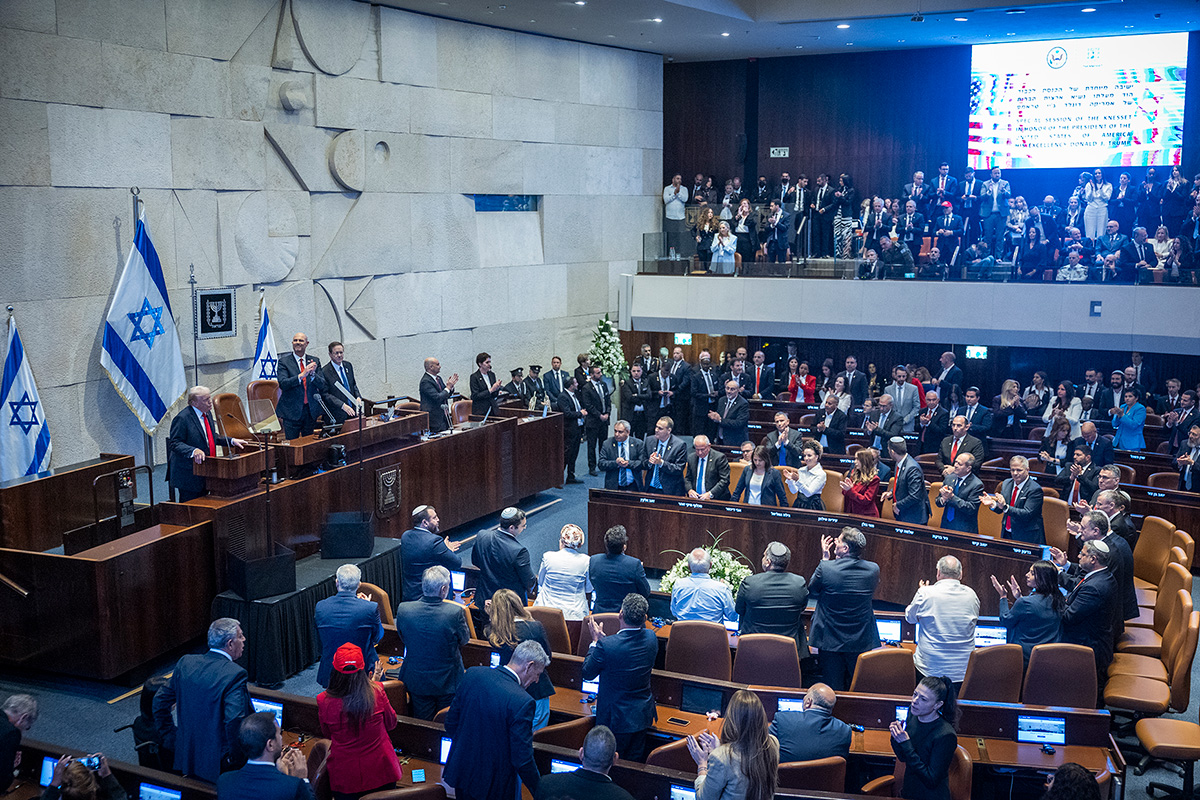
U.S. President Donald Trump delivering an enthusiastically received
speech during a special plenum session in his honor at the Knesset, the
Israeli parliament in Jerusalem, on October 13, 2025
Netanyahu is going into an election year, with the public going to the polls in October 2026 at the latest, and every decision he makes will be taken with an eye toward winning what, as ever, looks sure to be a close-run race. He is heading into the campaign with plenty under his belt — the living hostages back home, a very successful war against Iran and its proxies, a resilient wartime economy — but with dangerous vulnerabilities.
He is vulnerable to growing attacks from the left that he is not enforcing the ceasefire vigorously enough, and that he is not compelling Hamas to hand over the remaining bodies of slain hostages. He is still the leader who oversaw Israel’s greatest failure on October 7, 2023, while almost all the other senior officials in office during the Hamas invasion have accepted responsibility and stepped down, and is resisting the powerhouse state inquiry into the debacle that most of the public is demanding.
Netanyahu is also losing some of his key allies in his office. Chief of Staff Tzachi Braverman is heading to St. James Court as envoy to the UK, Strategic Affairs Minister Ron Dermer is retiring and he just fired his longtime ally Tzachi Hanegbi as national security adviser.
He is also saddled with — and dependent on — coalition partners who sometimes seem so oblivious about Israel’s relations with the world that, in only the latest example, they gratuitously insult the Saudis just as Trump is working hard to foster a normalization deal.
Despite Netanyahu’s pride in his productive and firm relationship with the world’s most powerful man, that alliance is restraining him from performing his usual political acrobatics to keep just enough constituencies on his side to preserve his rule.
Netanyahu has found his way out of political snares in the past. But with Trump in control of so much of what happens between now and the elections, and so focused on Gaza, the prime minister will likely remain in perilous territory until the election votes are cast, wrapped in that warm but constricting presidential embrace.

No comments:
Post a Comment